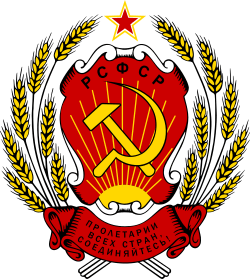Varvara Yakovleva (politician)
| Varvara Yakovleva Варвара Яковлева | |
|---|---|
 | |
| People's Commissar for Finance of the RSFSR | |
|
In office January 1930 – September 1937 | |
| Premier |
Sergei Syrtsov (until 1930) Daniil Sulimov (until 1937) Nikolai Bulganin |
| Preceded by | Nikolai Milutin |
| Succeeded by | Vasily Popov |
| Personal details | |
| Born |
1884 Moscow, Russia |
| Died |
September 11, 1941 or December 21, 1944 Oryol central prison, Russia |
| Political party | All-Union Communist Party (bolsheviks) |
| Parents | Nikolai Yakovlev, father |
Varvara Nikolaevna Yakovleva (Russian: Варвара Николаевна Яковлева) (1884 - 1941 or 1944) was a prominent Bolshevik party member and Soviet government official who later supported Leon Trotsky's attempt to democratize the party. She was sentenced to 20 years in prison in 1938 for membership in a "diversionary terrorist organization." She was shot in the Oryol Central Prison on either September 11, 1941 or December 21, 1944.[1]
Life
Yakovleva was born to middle-class parents in Moscow in 1884 and joined the Bolshevik Party when she was 20. During the 1905 Revolution, she was violently assaulted by the breasts, which had led to an exacerbation of her health with tuberculosis.[2] She was a candidate for membership in the Bolshevik Central Committee in 1917. She took notes at the meeting that set the date for the October Revolution of 1917. From March 1918 on she was a member of the board of the NKVD and worked in the Moscow Cheka, the Moscow secret police. From January 1919, as a board member of the People's Commissariat of Food, she led food inspections and parties that requisitioned food as a punitive measure. She was known for her severity in this matter. In October 1918 she opposed peace with the Germans. She was regarded as a left-wing Communist.[1]
In 1922 she became the Acting Minister for Education for the Russian Federation and in 1929 was named the Minister of Finance. Yakovleva was in favor of the politician Nikolai Bukharin's position on trade unions in 1920–1921. In 1923 she signed the "Letter of the 46", along with forty-five others, in support of Trotsky's attempt to reform the Communist party.
Imprisonment and death
Following the Third Moscow Trial in 1937, she was arrested and accused of being a member of a terrorist group. She was sentenced to 20 years in prison and, after the start of World War II, was shot to death on the orders of Lavrentiy Beria in the Oryol central prison. Different records give her date of death as 1941 or 1944.[1]
Her reputation was rehabilitated in 1958.[1]
Notes
- 1 2 3 4 Encyclopedia of Marxism: Glossary of the People. "Glossary of People: Ya". Encyclopedia of Marxism. Retrieved March 27, 2007.
- ↑ Stites, Richard (1991). The Women's Liberation Movement in Russia: Feminism, Nihilism, and Bolshevism, 1860-1930 (New ed. with afterword. ed.). Princeton, N.J.: Princeton University Press. p. 275. ISBN 0691100586.
